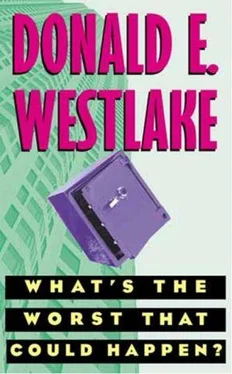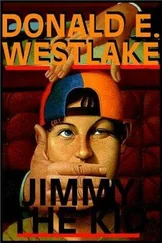Dortmunder looked up. “What?”
“She’s gone now.”
“Who?”
“There was a woman up there, leaning over the balcony, gotta be right near where we’re going tonight, she looked like Anne Marie.”
“Couldn’t be,” Dortmunder said. “The hotel’s over there.”
“I know. She just looked like. Well . . . from this distance.”
“And you probably don’t really know her looks yet,” Dortmunder pointed out, and added, “She’s a good sport, isn’t she.”
“I sure hope so,” Kelp said. “Let’s look at that garage some more.”
* * *
A little after three, they got back to Dortmunder’s room, and May wasn’t there. “Maybe they’re both in my room,” Kelp said, and phoned, but there was no answer. So they sat down at the round table near the balcony and the view—from here, up close, the teeth looked like a highway divider—and went over the notes they’d taken, the kinds of locks they’d seen, the internal TV monitors they’d noted, the posts and routes of the security personnel. They didn’t have information, of course, about the actual apartment and the lay of the land up there, but that would come later, when they went in.
About fifteen minutes after they’d arrived, May and Anne Marie came in, grinning, and Kelp said, “Hey, there. Have a good time?”
“Pretty good,” Anne Marie said, and May dropped on the round table in front of them a bunch of Polaroid pictures.
Kelp picked up one of the pictures and looked at it. A curving hall with round nearly flush ceiling lights. Gray patterned wallpaper, shiny brown wood doors, a kind of mauve carpet with a big complex medallion on it every ten feet or so. A red-lettered exit sign some distance away around the curve. Kelp said, “What’s this?”
“The hall outside the apartment where you’re going,” May told him, and pointed. “That’s the door to it right there.”
Anne Marie touched a couple of other pictures, saying, “This is an apartment just like the one where you’re going, only it’s two floors down. But it’s the same layout.”
Dortmunder and Kelp went through the pictures. Interiors, exteriors, balcony shots, elevator shots. Kelp said, “What is all this?”
“We thought it might help,” May said.
Anne Marie said, “We weren’t doing anything else, so what the heck.”
Kelp said, “So that was you, up on the balcony.”
“Oh, did you see me?” Anne Marie smiled. “You should have waved.”
Stunned, Dortmunder said, “May? How did you do this?”
“Turns out,” May said, “there’s only certain special real estate agents are permitted to list the apartments here, because it’s all co-ops. So every Sunday afternoon, between noon and three, there’s open house.”
“It’s over now,” Anne Marie said.
“The way it works,” May explained, “you go to the desk downstairs and check in—”
“I used my real name and ID,” Anne Marie said.
“There didn’t seem to be any harm in it,” May said. “Anyway, after a couple minutes a real estate agent comes and gets you and rides up in the elevator with you and tells you what’s available, and asks what you’re interested in.”
“There’s a lot of people at this open house,” Anne Marie said. “I got the idea a bunch of them are people already living there in that building, they just want to snoop around in their neighbors’ apartments.”
“So after you’ve looked at a couple places,” May went on, “you just tell the real estate agent thank you, I can find the elevator on my own, and you leave. And it’s okay because she’s got half a dozen other people she’s showing around.”
“So then you take the stairs,” Anne Marie continued, “and go wherever you want. If we knew how to pick locks, we could have gone right into that apartment you fellas want, and took pictures all over the place.”
Dortmunder and Kelp looked at each other, their mouths open. “If I’d known,” Dortmunder said, “I could have gone in there, done what they said, got into the apartment, and just wait for that son of a bitch to show up.”
“That would have been very nice,” Kelp agreed.
“It’s over now,” May said. “It’s after three.”
Anne Marie said, “But they do it every Sunday.”
“Next Sunday,” Dortmunder said, “Fairbanks isn’t gonna be here, and neither are we.” He sighed, then more or less squared his shoulders. “Okay,” he said. “No use crying over spilt blood. We can still get in, no problem.”
“When?” Kelp asked him.
“Early,” Dortmunder said. “If he isn’t there yet, we’ll wait for him. We’ll have an early dinner, the four of us, then you and me’ll go in. Nine o’clock. We’ll go in at nine.”
Sunday, 9:00 P.M. Max should have left hours ago for DC, but he was restless, troubled in his mind. So many things had gone so badly lately. Two burglaries. The loss of the Carrport house. The added complications of the bankruptcy, difficulties he had never anticipated. The insane detective in New York who so clearly believed that Max had arranged to burglarize his own homes, and who seemed perfectly capable of rooting around in Max’s affairs until he did find something illegal that Max might have done. It was all as though some black cloud were hovering above his head, confusing him, keeping him off-balance.
Nine P.M. The Hilton Head condo was dark and empty, except for himself in the spacious living room, seated on the broad canvas sofa, the table lamps on both end tables the only illumination. The secretary who had been here to help him with his statement before the congressional committee tomorrow, among other things, had come and gone, leaving him alone in the house. In a guest cottage half a mile away, a nameless chauffeur awaited his call, already well overdue. Here in the condo air-conditioning hummed, and beyond the broad uncurtained front windows stretched the wide porch, the regular narrow pickets of the porch rail, and then the Atlantic, extending far out eastward under a pale moon and a black sky, the sea’s black surface glinting here and there and over here, as though tiny men in black armor were creeping ever closer.
Open on the glass coffee table in front of him was The Book, the I Ching. He’d been reading it, dipping in here and there, hoping for general guidance, somehow reluctant to open the door to his own particular situation. But why? He’d never been afraid to know his destiny before. That destiny, whatever by way of destiny he might still have out ahead of himself, was all lagniappe anyway, a treat from the master of the house, an extra serving of dessert, a long and delicious overtime following the brief harsh course he was supposed to have led. So why be afraid now?
I’m not, he decided, and reached for the three shiny pennies on the glass coffee table, and six clattering tosses later—loud, the copper pennies on the glass—he had his current reading, this moment in his life, and there was Tui! His own Joyous trigram, in the upper half of the hexagram, with the only moving line at the base of it, the nine in the fourth place. The lower trigram was Chên, the Arousing, Thunder, and the number of the hexagram was 17, and its name was Following.
Following? Max had never seen himself as following, as being a follower. Could it mean those who followed Max? And if so, was it for good or for ill? Could the follower be the New York detective, Klematsky? Could it be that hapless burglar? Could it be the damn bankruptcy judge, dogging his tracks?
Max bent over The Book, studying its words. Following, the Judgment: “Following has supreme success. Perseverance furthers. No blame.”
Yes, yes, he knew The Book well enough by now to furnish the words it would customarily elide. What the judgment meant was, no blame would accrue to Max if he persevered, but in this situation (whatever this situation was) perseverance was linked with the concept of following, and it was only in understanding the link between the two that he could succeed.
Читать дальше












